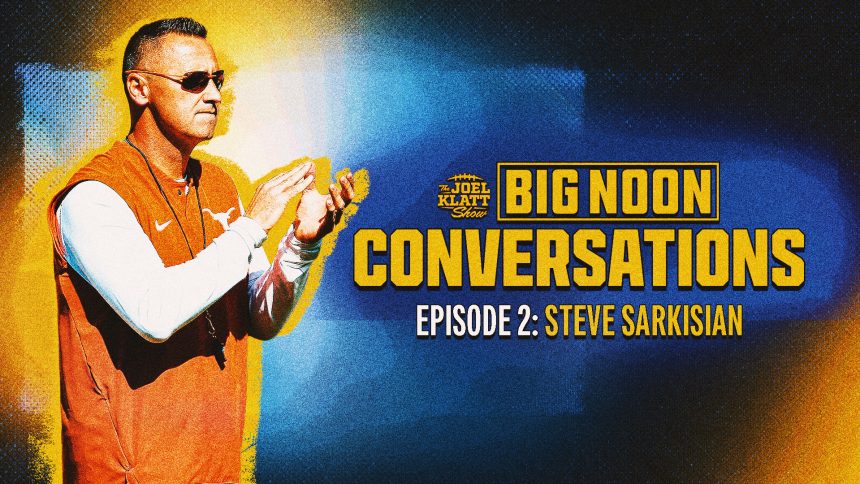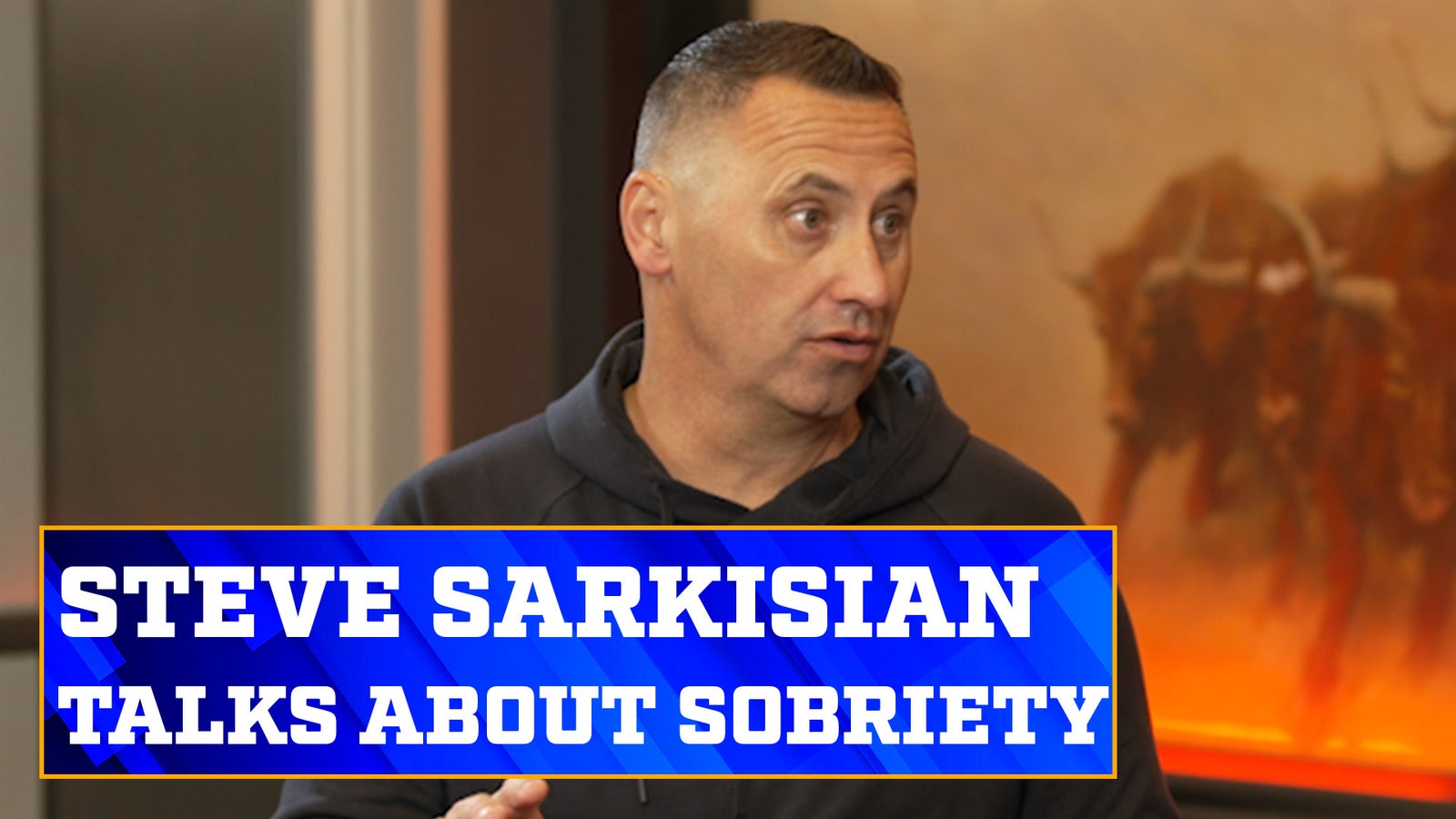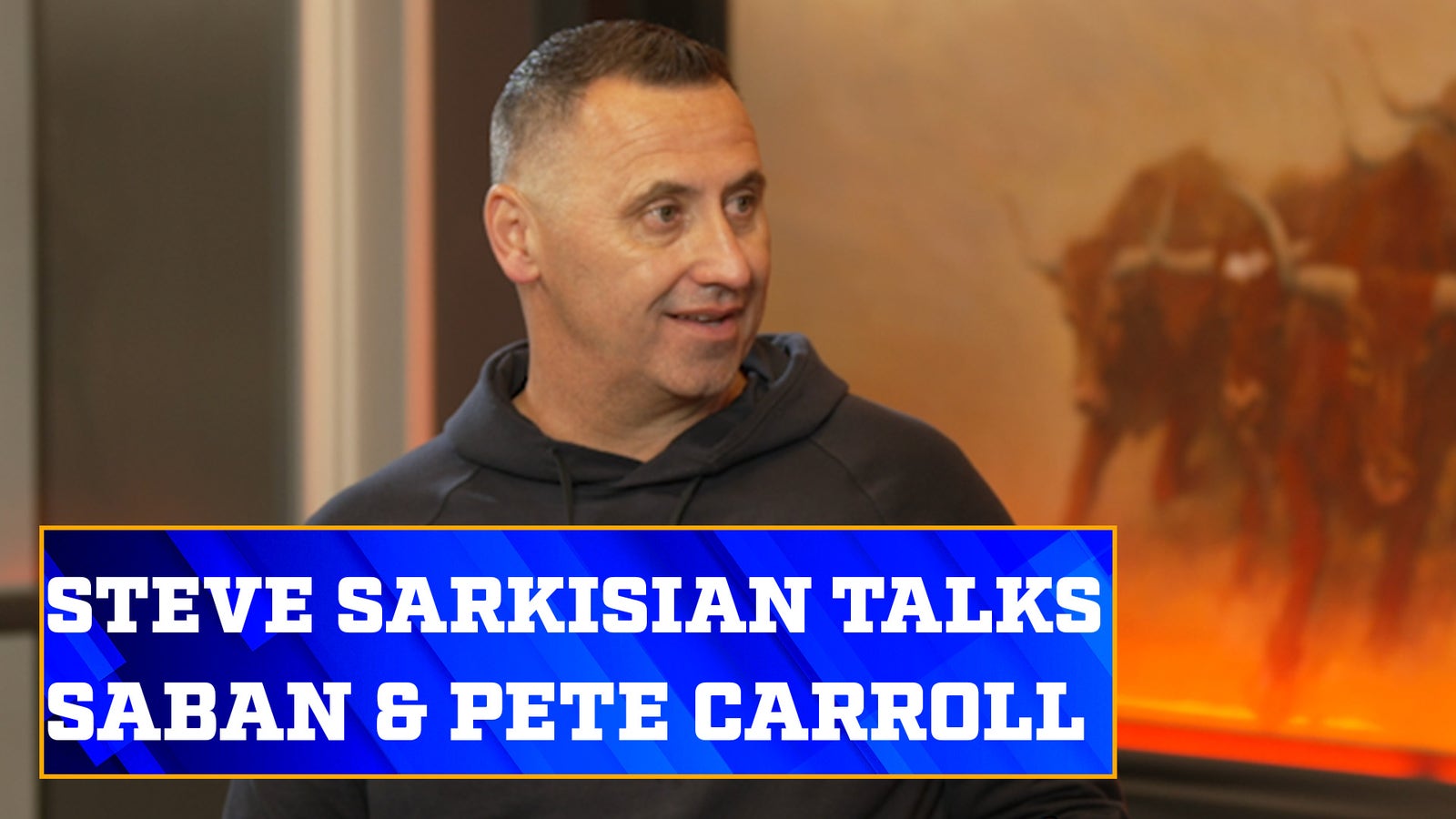On the season premiere of “Big Noon Conversations,” I spoke with Michigan head coach Sherrone Moore about handling the expectations of replacing a national championship-winning coach at a major program.
This week, I sat down with a coach who has lived up to the lofty expectations that come with running a major college football program. Steve Sarkisian, who is set to enter his fourth season at the University of Texas after leading the Longhorns to a spot in the College Football Playoff last season, joined me on the second episode of “Big Noon Conversations.”
We chatted about the culture he’s built in Austin, what he’s learned from his coaching mentors that led to him having the best season of his head coaching career last year, and the challenges he deals with being the head coach of Texas.
Here’s a snippet of my conversation with Sarkisian.
ADVERTISEMENT
[Read more: Sherrone Moore reveals promise Jim Harbaugh made before becoming Michigan’s coach]
Change is coming [to college football]. Not just Texas going to the SEC. Now, all of a sudden, we have an expanded playoff. You guys are trying to navigate this move to the SEC. How has it impacted the way that you want to build your program, if at all?
What’s unique about this, I feel like college football started to really change in this era. It has changed every era, right? But in this era, I feel like right when I took this job, I came right at the tail end of that COVID season, right? Coming out of that COVID season, all of a sudden, the NCAA said we’re gonna have this thing called the transfer portal, and we’re going to adjust it.
Not to interrupt you, but they threw up their hands.
OK, so that was the first part of like, we’ve got this thing, the transfer portal now. So you mean every kid can transfer every year, whenever they want? But oh, wait, we’re gonna have these windows. OK, cool. But there’s two windows. So that was the first thing that happened. The second thing was this thing called NIL (name, image and likeness) that’s come into play since we’ve been here. Alright, what does that look like? Now, as we’re seeing it, it’s moving in a direction where it’s like, do whatever you want, basically.
And they’re not going to police anything.
Yeah, so we’re going through that one. Then, there’s this whole thing called conference realignment. Oh, by the way, Texas is on the front line of that. We’re going to the SEC. We’re the bad guys, because we were the ones that decided to go first, and then the floodgates opened on that. We’ve got USC, Oregon and UCLA going to the Big Ten. We’ve got Cal and Stanford playing in the ACC. So, all of these different things, and then, all of a sudden, the College Football Playoff is shifting. Now, we’re going to 12 and it’s 14 down the road.
So, naturally, over the time that we’ve been here, it’s like, what is the one thing that we can control? All this other stuff is happening and we have to adapt, right? You have to continually adapt in college football. That was something Coach [Nick] Saban had taught me early on in my time [at Alabama], adapt or die. There’s a reason Dinosaurs aren’t on the earth anymore, right? They couldn’t adapt. So we’ve had to adapt right as this has gone on.
But it all comes back to our culture. Of all the stuff that’s happening, how good can our culture be in this building? Whether it’s the players, the support staff, the coaching staff, the administration, is everyone on the same accord? Is everybody talking the same language? Is everybody working together? Do we have a healthy environment that people want to come in here every day or do they have to come here every day? Are they looking to see what’s on the other side of the fence? Is the grass greener? That’s not just players. Coaches are moving around the country now too, more than ever. How do we create an environment where people want to be here every day, are striving for a common goal and committed to this thing, collectively? In turn, through team success, come the individual accolades, awards, honors, draft picks and things of that nature.
I think that’s one thing that we’ve been really consistent with, and I think that’s where the joy comes from. For me as a coach, I feel so good about what we’ve built culturally. Granted, we’ve got good players and all that, and we’ve got great facilities. But the culture thing is the one thing, to me, that I’m most proud of, because I hear other coaches complaining about different things in their program.
You and I constantly talk about this culture you’re building. I’m so fascinated because you seem to be not only intensely focused on it, but also involved in it. You and I share this, I’m coming up on 13 years sober. You’re also sober. That was a huge shift in my life and a commitment I had to make: How open was I going to be about it, how forthright was I going to be about it? You’ve had to make that same choice and how open you are with it, in particular with your team, is almost central to what you do from a culture standpoint. How did you make that decision?
Well, some of them got made for me, I’ll be honest with you. When all of my stuff occurred initially, it was national news. I mean, it was on the ticker, it was on every sports talk radio show. It really wasn’t something that I could hide from. The reality was, “OK, this is public knowledge. This is public information. I’m a public figure at this point. How are you going to address it? How are you going to deal with it?” Then as I navigated my way through it, and being open and honest with those that I was close to, I got back into the coaching ranks.
I quickly realized, in coaching, there’s this thing called “negative recruiting.” I’m not sure if you’ve ever heard of this Joel, but some coaches love to talk about another school or another coach. Naturally, it was not easy to figure out that other schools and coaches were going to try to use that against me. So, I really became open, honest and vulnerable with the recruits and their families first to talk through my story.
Then, I came to find out, why would I not want to share all of that with our team? I always felt like 18 to 22-year-old males, if there’s a guarded group of individuals in our society, it’s that group. Trust is not at the highest level, being vulnerable, open and honest are not at the top of the priority list for a lot of young men. We want to suppress things, we want to keep things down. So, how do I get them to feel comfortable to do that? Well, why don’t I share? Why don’t I become vulnerable? … Every year, at the start of the summer, I tell my story. There’s some guys that have sat in there for three or four years now and have heard the same story. Every time they pick up a little something different.
We’ve all got things in our past that we’ve had to work through and continue to work through. We’ve created a platform for the players to start to share. What happens is there’s some empathy. I know what you’re going through, man, and I know if you look a little off today, I’d have something to tap into, whatever it might be. In the end, I think that really did draw us closer.
This culture of vulnerability certainly resonated with last year’s group. I could sense that when I was with Jonathon Brooks. The only other team that I sensed that with was Michigan. How did you see your culture manifest on the field last year, in a way that was tangible?
To me, culture is organic. It’s not something that you list out in a team meeting. I think it naturally occurs. Every family dynamic has its own culture. I think that starts at the top. How are your parents? How were you raised? What is leadership?
I read something that a good friend of mine, John Gordon, put out this morning. It was about leadership isn’t what you put on social media, it’s how you live every day.
The example that we give to the culture that we want, as coaches, that the players can look to and say, ‘Hey, that is something I want to emulate. That is somebody I want to be like. That is somebody I want to shape my life toward.”
I was telling the group last year at the end of the year, not only did they buy into our idea of the culture, I felt like the leaders on that team last year elevated it.
Speaking of leadership, you’ve gotten to coach great players, coach under great coaches, but specifically two guys that just stepped away, Pete Carroll and Nick Saban. Those are, I would have to imagine, the most influential coaches in your career?
Hands down.
What did each of them bring to you?
If you look at their careers, the second half of their careers is when they really took off. Both of them at right around 50, and then the last 20, 22 years, they’re both 72, have been the greatest years of their careers. Well, why is that? What happened? I asked both of them the exact same question and really got the exact same answer: They figured out who they were. Then, they coached who they were, rather than trying to be something that they’re not. When you try to be something you’re not, when adversity strikes, the real you comes out. Then, everybody around you is like, “Who the hell is that guy? That’s not who he was yesterday.”
For me, that was probably the biggest thing because, if you remember, I was 34 years old when I was the head coach at the University of Washington. I didn’t know what the heck was going on. One day I was like this, the next day I was like this. At that time, I used this analogy: I was a thermometer. I was walking into whatever the situation was, whatever the temperature was, that’s how I responded. I’ve gotten to now, I’m a thermostat. I set that temperature for how I want it to be every day and then others can either buy into that temperature or not.
That’s the beauty of having the opportunity to work for those two guys. They’re drastically different, but they figured out who they were.
That brings me to [Saban’s] comments after he retired. He has been incredibly forthright with his displeasure with where we’re at in college football and what he thinks it’s done to the young men playing college football. He basically said, “My conversations were, how much am I going to play and how much are you going to pay me?” He decided it was not for him. In this environment, how do you grow and also adapt to not be a dinosaur?
I think, one, why did you choose to come to Texas? There’s a formula to that. If you lead with NIL to get a young man to come to your school, a year from now, what’s he going to ask about first? Our perspective and approach to this is we’ve got an amazing product here. The history and tradition of Texas football is second to none. The quality of education at UT is incredible. The coaching staff, we have the development of our players, the trajectory of what we’ve done from Year 1 to Year 2 to Year 3 of our program, the city of Austin, all these things that we’re talking about. That’s why I want you to come to the University of Texas. NIL doesn’t come up. That should be the last reason to choose to go to a school, whether it’s Texas or any other school.
We try to create a culture that is a little bit different that way. I think we’ve got a healthy NIL program here. Texas One Fund is fantastic, but I got a lot of players that could probably go to another school and make more money. I think we’ve created a culture that they like being part of. They get treated really well. They feel like they’re getting developed on and off the field. They’ve got a brotherhood with their teammates in that locker room that they succeed with.
Joel Klatt is FOX Sports’ lead college football game analyst and the host of the podcast “The Joel Klatt Show.” Follow him on X/Twitter at @joelklatt and subscribe to the “Joel Klatt Show” on YouTube.
recommended

Get more from College Football Follow your favorites to get information about games, news and more














